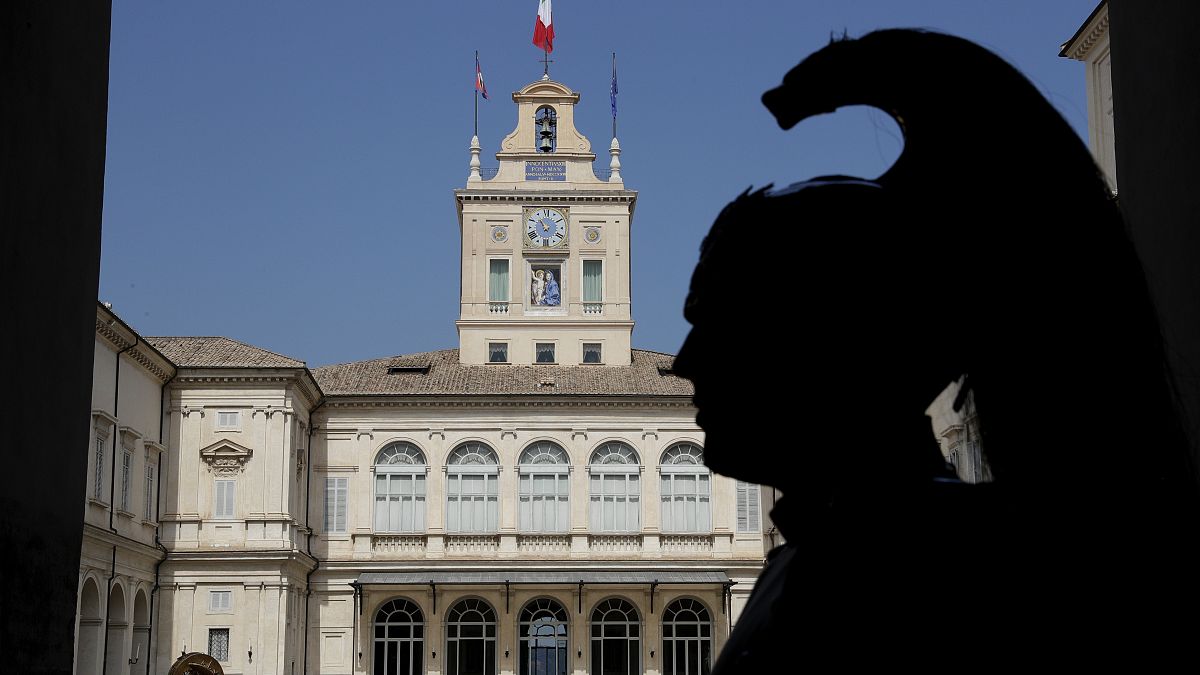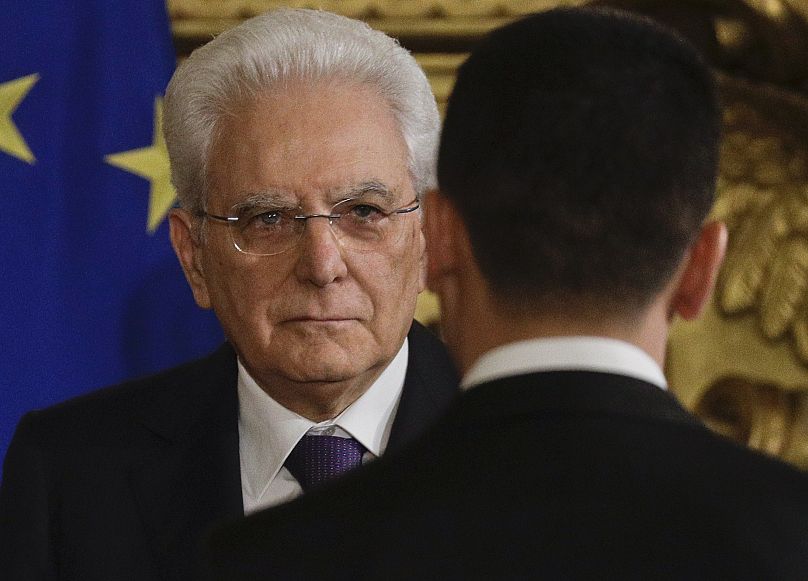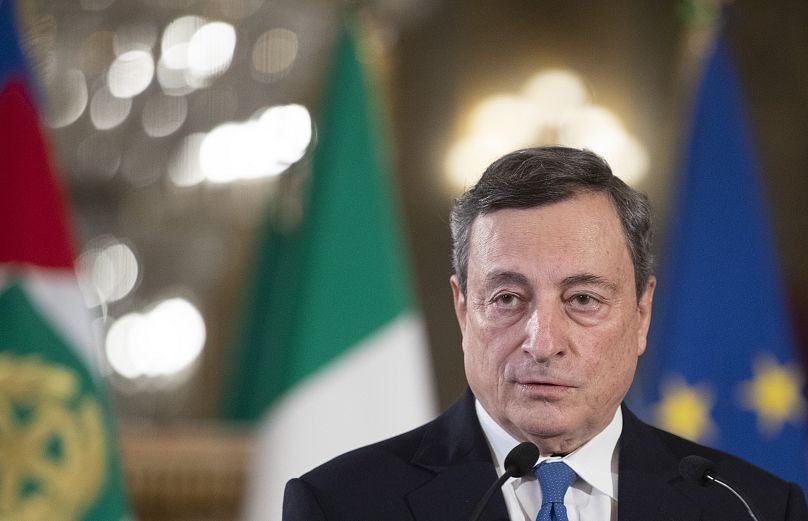Anyone over the age of 50 with "full civil rights" is eligible to be Italy's president.
The news that voting begins today in Italy to choose a new president might not exactly set hearts racing.
But, delve a bit deeper, and it's more interesting than it first looks.
How does Italy's presidential election work?
Firstly, it's one of the most idiosyncratic and mysterious presidential elections in Europe.
While in countries such as France it's the people who elect a new president at the ballot box, in Italy it's done by 630 MPs, 321 senators and 58 regional representatives.
More unusually, rather than limiting it to a serving politician, Italy allows anyone over the age of 50 with "full civil rights" to be eligible for the role.
The somewhat mysterious process, which takes place over the course of rounds until a candidate obtains a majority, has garnered comparisons to the Papal conclave and stands as an outlier in Europe.
It has resulted in non-politicians like Gianni Versace’s brother, Santo, actress Sophia Loren and even an ‘Ndrangheta Mafia boss emerging as nominees.
Speaking to Euronews, Francesco Silvestri – an MP for the Five Star Movement – shed light on how certain unlikely names end up popping up.
“There are agreements and manoeuvers going on that result in 10 or 15 votes being cast for a specific person,” he told Euronews, “This all happens behind the scenes.”
Lawyer and constitutional expert, Marco Ladu, further explained the reasoning behind the process’ perceived idiosyncracies, namely why presidents are selected secretly by lawmakers as opposed to the general public.
“There are two main reasons behind the peculiarity of it all,” he said. “To avoid the president’s contraposition with the will of the two houses [in parliament] and to assure that he or she has the needed serenity and independence to fulfil their role, both of which could be compromised by a direct election.”
Residing in the Quirinal Palace, the president of Italy -- as head of state -- is to ensure that the constitution is being upheld.
Unlike the Prime Minister, the president of the republic does not have an executive function, and rather represents the “point of connection” between the three branches of power.
While the role is largely ceremonial, the president can flex his or her muscles, such as in the appointment of prime ministers or -- as head of the Italian armed forces -- during wars and other national emergencies.
Why is the election happening now?
Because Sergio Mattarella, having come to the end of his seven-year mandate, will be stepping down from the role.
He has presided over multiple crises -- such as the COVID-19 pandemic -- and is widely perceived as being a beacon of stability during a particularly rocky time.
Mattarella enjoys widespread public support, meaning that finding a replacement has been a challenge.
The list of proposed nominees has comprised fresh and not-so-fresh faces, including the controversial former prime minister and media magnate, Silvio Berlusconi.
Berlusconi's bid initially turned the presidential election into one of the country’s most heated in memory. On Saturday, however, the 85-year-old pulled out of the race, claiming he had the votes to win but that the country could ill-afford political divisions during the pandemic.
Who is in the race to be Italy's next president?
As Italy heads towards the first round on 24 January, a variety of names have been touted as possible candidates – although, as a result of the process’ secrecy, making reliable forecasts is a tricky business.
Italy’s incumbent Prime Minister, Mario Draghi, is widely perceived as a popular choice for the role, although certain commentators and investors fear that his early departure from the government could leave the country in an unstable position.
There have even been suggestions, especially popular within the Five Star Movement, that Mattarella may be picked again for the running.
None of the initial candidates, however, are as famous -- and intensely polarising -- as Berlusconi.
He governed Italy three times between 1994 and 2011, as head of the country’s centre-right coalition, which united moderate Christian democrats, hard-line post-fascists, Northern separatists and even a handful of social democrats.
Throughout this tenure, Berlusconi was caught up in a variety of scandals that have entwined his private and public life – ranging from reports of “Bunga Bunga” orgies and allegations of soliciting a child for sexual services to accusations of corruption and links with organised crime.
While his supporters have praised him for his purported business acumen and magnetic appeal, he has been condemned by detractors for supposedly fostering a Borgia-like culture of favouritism and for using his popular TV channels as vehicles for electoral propaganda.
His crimes in the court of public opinion may have been many and diverse, but in the eyes of the law, it was dodging taxes that sealed the deal. In 2013, he was convicted by Italy’s Supreme Court for evading around 7 million euros in taxes through his company, Finivest, resulting in him being sentenced to four years of imprisonment (reduced to one year of community service) and disbarred from public office for six.
Such a background may make him an unlikely candidate for the ceremonial gravitas expected of a president, but before withdrawing from the race he had been the centre-right’s nominee: the hard-right populist Northern League (Lega Nord), headed by former deputy prime minister Matteo Salvini, and the national-conservative Brothers of Italy (Fratelli d’Italia), whose leader – Giorgia Meloni – is Italy’s new breakout star in the opinion polls, had officially teamed up with their coalition ally in supporting his presidential bid. This is in spite of dissent within the bloc - the League’s own Chamber of Deputies group leader, Riccardo Molinari, called him “divisive” - and Salvini’s own fraught relationship with Berlusconi, having previously criticised him.
'Terrible ramifications'
Prior to Berlusconi pulling out, Euronews spoke to Alex Bazzaro, a Northern League MP since 2018 and Salvini’s former social media manager, to gauge his thoughts on the upcoming presidential election.
At only 34 years of age, Bazzaro is one of the lower house’s younger members and was ten days shy of his seventh birthday when Berlusconi won his first general election in 1994. Now, Bazzaro will be enthusiastically supporting Berlusconi’s presidency.
“It’s the first time the centre-right [coalition] is putting forward its own presidential candidate, and that’s a good thing,” he exalted. “The public will is there for him [Berlusconi] to be the country’s leader.”
When asked about whether Berlusconi’s scandals and controversies could prove unpopular among the League’s electorate – who are largely attracted to the party’s unwavering law-and-order mantra – Bazzaro re-iterated his thoughts that his voters would “appreciate that the centre-right has put forward and united behind its own candidate”.
Bazzaro’s response to Molinari’s accusations that a Berlusconi presidency could prove divisive: “If he’s divisive, it’s only with the left.”
Indeed, Berlusconi’s candidacy had left many on the other side of the political spectrum, and even the League’s former government coalition allies – the Five Star Movement – deeply concerned.
Silvestri, who is a first-time voter in the presidential elections, was particularly aghast by the proposition.
“If Berlusconi were to become president, it would be a very bad thing for us,” he confessed to Euronews. “As a movement, we were born against everything he stands for, especially given his many trials and allegations of links with the mafia.
“It would have terrible ramifications not only for Italy’s image but for its international credibility and thus the economy
“After all the country has been through, Italy simply can’t afford to have Berlusconi as its president.”
Every weekday, Uncovering Europe brings you a European story that goes beyond the headlines. Download the Euronews app to get a daily alert for this and other breaking news notifications. It's available on Apple and Android devices.


